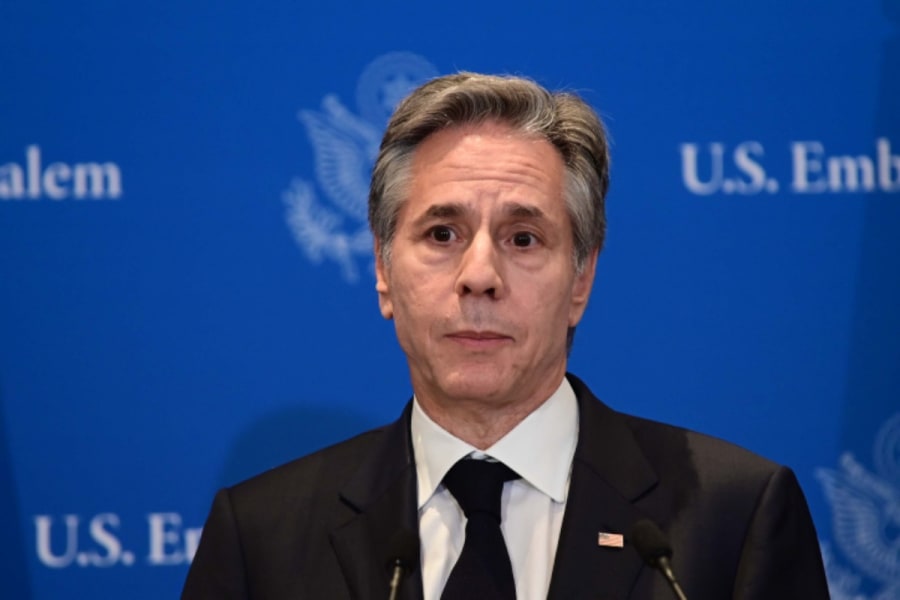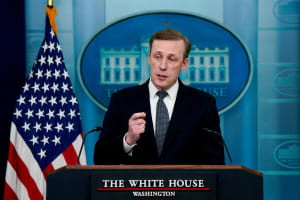Blinken acknowledges Israel's rejection of Palestinian state could derail Saudi normalization
Saudi Kingdom demands 'horizon' for Palestinian state to advance a deal

After months of the Biden administration exerting increased pressure on Israel, U.S. Secretary of State Antony Blinken admitted for the first time that Israel might not be ready to accept a Palestinian state as a condition to normalize relations with Saudi Arabia.
“The Saudis demand a ceasefire in Gaza and a pathway to a Palestinian state, and it may well be that Israel isn’t able, willing to proceed down this pathway,” Blinken said as he testified before the U.S. Congress on Tuesday.
“It must decide if it wants to take advantage of this opportunity to achieve something sought from its founding,” he added.
His comments came the day after U.S. National Security Advisor Jake Sullivan wrapped up his visit to Israel on Monday, following a visit to Saudi Arabia.
Sullivan met with Saudi Crown Prince Mohammed bin Salman (MBS) to discuss a joint security agreement between the Kingdom and the United States, which may include a path to normalization with Israel.
“The semi-final version of the draft strategic agreements between the kingdom and the United States of America, which are almost being finalized – and what is being worked on between the two sides in the Palestinian issue to find a credible path – were discussed,” read the statement released following the talks.
On Monday, a senior official in the Saudi royal family told Israel’s KAN news outlet the Saudi government would not be able to advance normalization without Israel providing a “horizon” toward a Palestinian state.
The official confirmed that this would be an "Arab and Islamic requirement," and that the Saudi Kingdom would be at risk of being portrayed "as disloyal" if it waived this condition.
The negotiations between the U.S. and Saudi leadership come amid concerns over King Salman's health, as he postponed a planned visit to Japan when the aging monarch was hospitalized for pneumonia in recent days.
While MBS has taken over most of the active government responsibilities, King Salman is reported to have a more rigid position on the Palestinian issue, whereas the Crown Prince appears willing to make concessions in exchange for normalization.
Israel's Prime Minister Benjamin Netanyahu and numerous other Israeli leaders have rejected international pressure to establish a Palestinian state, especially coming on the heels of the Oct. 7 massacre.
On Tuesday, the National Unity party, led by Israeli War Cabinet Minister Benny Gantz, reiterated that it also would not support a Palestinian state, even in exchange for normalization.
U.S. Ambassador to Israel Jack Lew, commented on the issue on Tuesday, affirming the Biden administration’s position that a trilateral deal between Jerusalem, Riyadh and Washington necessitates a winding down of the war in Gaza and a discussion about the ‘day-after’ Hamas is defeated.
“There’s going to have to be some period of quiet, I think, in Gaza, and there’s going to have to be a conversation about how do you deal with the question of the future of Palestinian governance,” Lew said.
“My view is that strategic benefit is worth taking the risk of getting into that conversation about. But that’s a decision that the government of Israel will have to make, and the people of Israel will have to make,” he said at a conference hosted by the Israel Democracy Institute (IDI) think-tank.
“Of course, we want to expand the circle of peace. We haven’t been shy about this,” Israeli government spokesperson Tal Heinrich noted on Tuesday while cautioning that “any peace initiative that jeopardizes Israel’s security is not something that we see as real peace.”

The All Israel News Staff is a team of journalists in Israel.
You might also like to read this:















